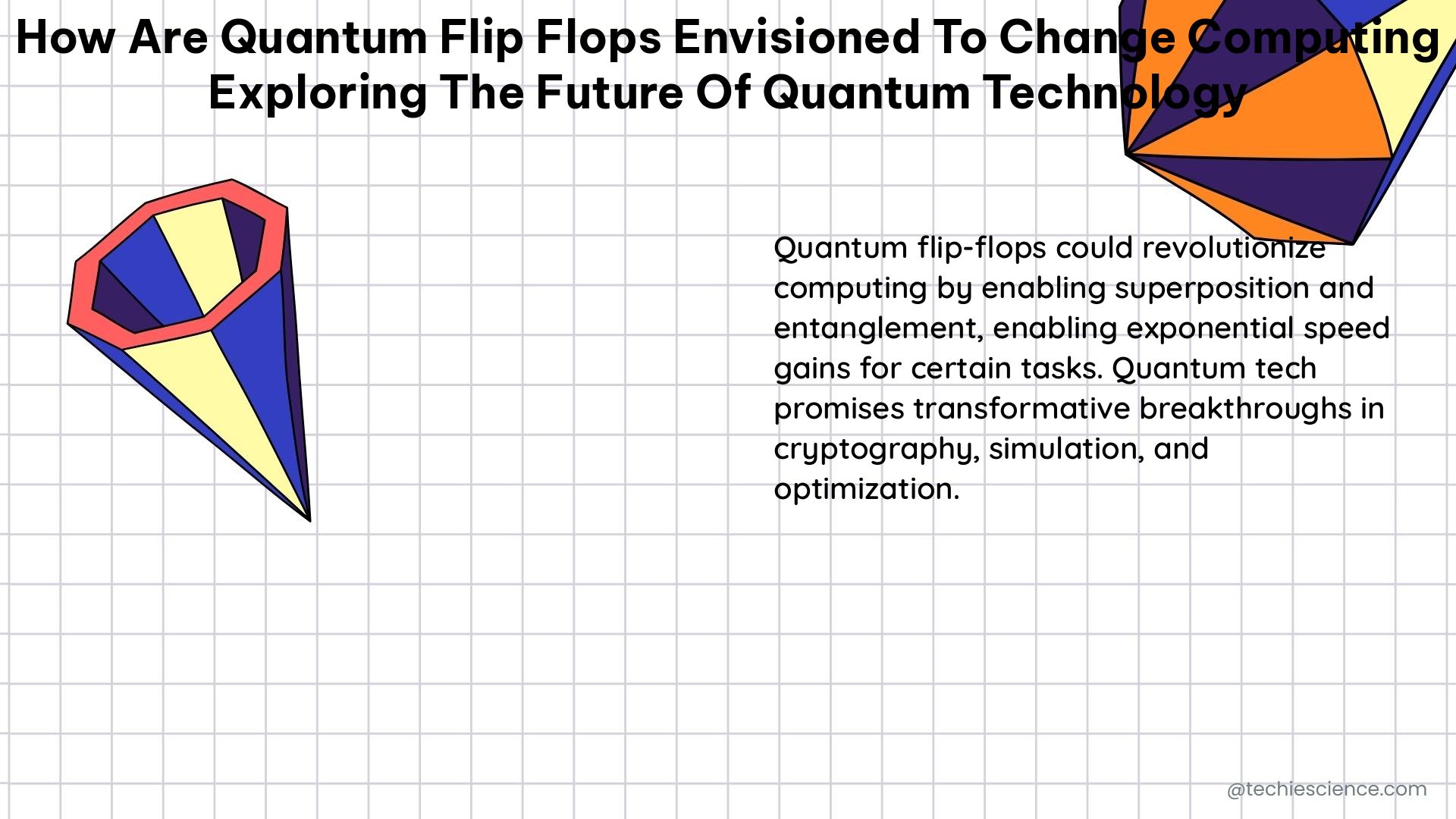Quantum flip-flops, also known as “flip-flop qubits,” are a groundbreaking new type of quantum bit that combines the exquisite quantum properties of single atoms with easy controllability using electric signals. These innovative quantum devices are poised to significantly change the landscape of computing and the future of quantum technology due to their unique properties and remarkable potential for scalability.
Advantages of Flip-Flop Qubits: Ease of Control and Scalability
One of the key advantages of flip-flop qubits is their ability to be controlled using electric signals, rather than the more challenging magnetic fields required by other types of qubits. This makes them much easier to integrate with conventional electronic circuits and allows them to communicate over larger distances. This is in stark contrast to other qubit designs, which often require precise placement and intricate magnetic field manipulation, making them more challenging to scale up and incorporate into larger quantum systems.
Flip-flop qubits have demonstrated the remarkable ability to maintain quantum entanglement across much larger distances than ever before. This is achieved by their unique ability to encode information on both the electron and nucleus of a phosphorus atom implanted within a silicon chip. This breakthrough enables the creation of scalable quantum computers that can potentially be made smaller and more affordable, paving the way for widespread adoption and accessibility.
Technical Specifications and Performance Characteristics

In terms of technical specifications, flip-flop qubits have been shown to operate at temperatures close to absolute zero and in the presence of a magnetic field. These qubits have also been demonstrated to have exceptionally high-fidelity quantum operations, with error rates as low as 0.1%. This level of precision and reliability is a crucial factor in the development of large-scale quantum processors capable of performing complex computations.
The use of electric dipoles in flip-flop qubits enables strong electrical coupling between individual qubits, which can mediate the multi-qubit quantum logic operations necessary for practical quantum computations. This is a critical consideration for the advancement of large-scale quantum processors, as it allows for the seamless integration and coordination of multiple qubits within a quantum system.
Scalability and Integration with Conventional Electronics
One of the most exciting aspects of flip-flop qubits is their potential for scalability. Unlike other qubit designs that struggle with integration and scaling, flip-flop qubits can be easily incorporated into existing electronic circuits and scaled up to create larger quantum systems. This is due to their ability to be controlled using electric signals, which are ubiquitous in modern electronics.
Researchers have demonstrated the ability to fabricate flip-flop qubits using standard silicon chip manufacturing processes, further enhancing their scalability and potential for mass production. This compatibility with established semiconductor technologies opens the door for the seamless integration of quantum computing capabilities into a wide range of electronic devices, from smartphones to supercomputers.
Potential Applications and Impact on Quantum Computing
The unique properties of flip-flop qubits have far-reaching implications for the future of quantum computing and its applications. Their scalability and ease of control make them a promising candidate for the development of large-scale quantum processors capable of tackling complex computational problems that are beyond the reach of classical computers.
Potential applications of flip-flop qubit-based quantum computers include:
-
Cryptography and Cybersecurity: Quantum computers have the potential to break many of the encryption algorithms used to secure modern communication and data storage. Flip-flop qubits could enable the development of quantum-resistant encryption methods, strengthening the security of our digital infrastructure.
-
Quantum Simulation and Modeling: Quantum computers excel at simulating the behavior of complex quantum systems, such as chemical reactions and material properties. Flip-flop qubit-based quantum computers could revolutionize fields like materials science, drug discovery, and climate modeling.
-
Optimization and Decision-Making: Quantum computers can solve certain optimization problems, such as logistics and scheduling, much more efficiently than classical computers. Flip-flop qubits could enable the creation of quantum-powered decision-support systems for a wide range of industries.
-
Quantum Sensing and Metrology: The exquisite quantum properties of flip-flop qubits could lead to the development of highly sensitive quantum sensors and measurement devices, with applications in fields like navigation, geophysics, and medical imaging.
As the research and development of flip-flop qubits continue to progress, we can expect to see even more exciting advancements and breakthroughs in the field of quantum computing and technology. The potential of these innovative quantum devices to revolutionize computing and transform various industries is truly remarkable.
Conclusion
Quantum flip-flops, or flip-flop qubits, represent a significant leap forward in the quest to harness the power of quantum mechanics for practical computing applications. Their unique ability to be controlled using electric signals, maintain quantum entanglement over large distances, and integrate seamlessly with conventional electronics make them a highly promising candidate for the development of scalable and accessible quantum computing systems.
As the research and development of flip-flop qubits continue to progress, we can expect to see even more exciting advancements and breakthroughs in the field of quantum computing and technology. The potential of these innovative quantum devices to revolutionize computing and transform various industries is truly remarkable, and the future of quantum technology has never been more promising.
References:
- The ‘flip-flop’ qubit: Realization of a new quantum bit in silicon controlled by electric signals. (2023, February 13). Retrieved from https://phys.org/news/2023-02-flip-flop-qubit-quantum-bit-silicon.html
- Flip Flop Qubit – Australian Engineers Design Completely New Quantum Computing Architecture. (2017, September). Retrieved from https://www.borntoengineer.com/flip-flop-qubit-australian-engineers-design-completely-new-quantum-computing-architecture
- Rostyslav Savytskyy et al, An electrically driven single-atom “flip-flop” qubit, Science Advances (2023). DOI: 10.1126/sciadv.add9408

The lambdageeks.com Core SME Team is a group of experienced subject matter experts from diverse scientific and technical fields including Physics, Chemistry, Technology,Electronics & Electrical Engineering, Automotive, Mechanical Engineering. Our team collaborates to create high-quality, well-researched articles on a wide range of science and technology topics for the lambdageeks.com website.
All Our Senior SME are having more than 7 Years of experience in the respective fields . They are either Working Industry Professionals or assocaited With different Universities. Refer Our Authors Page to get to know About our Core SMEs.